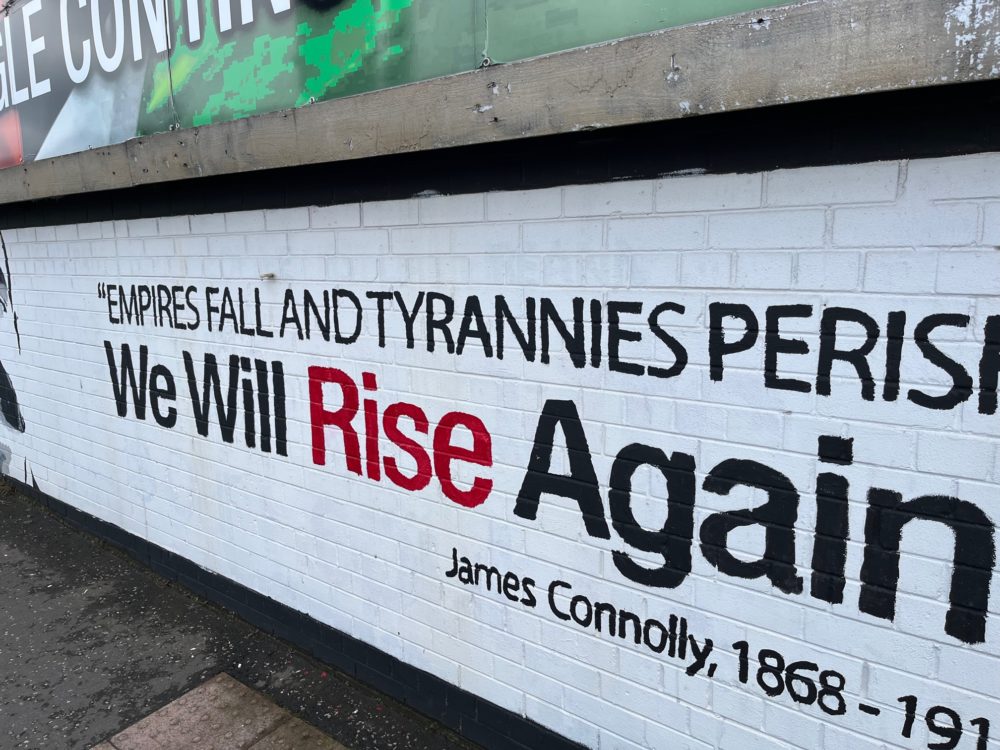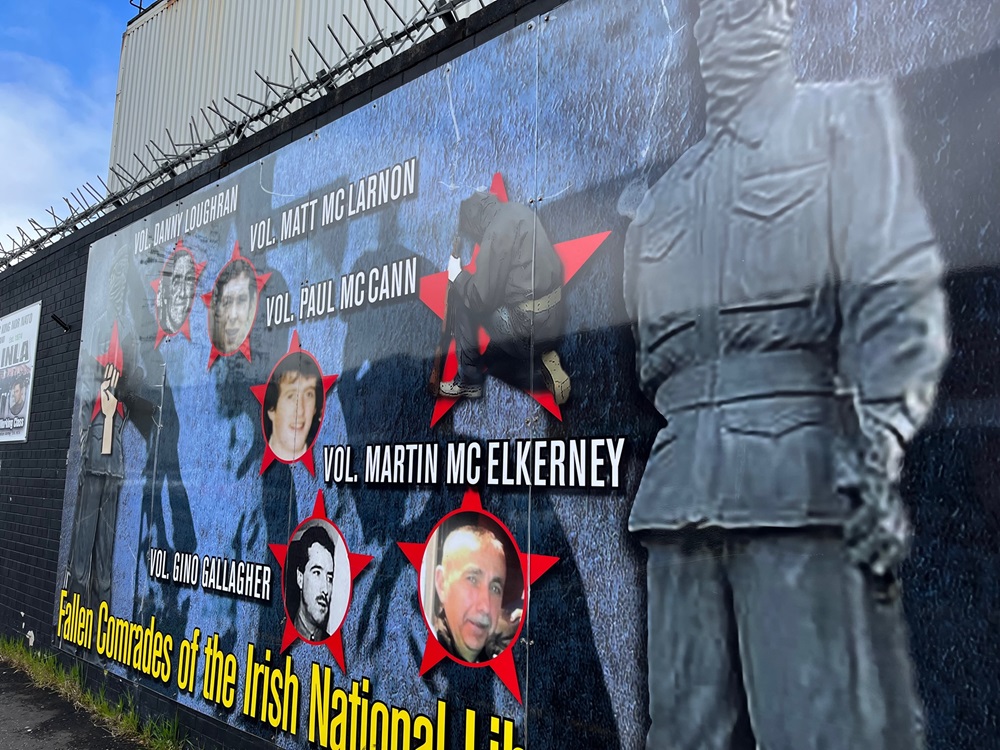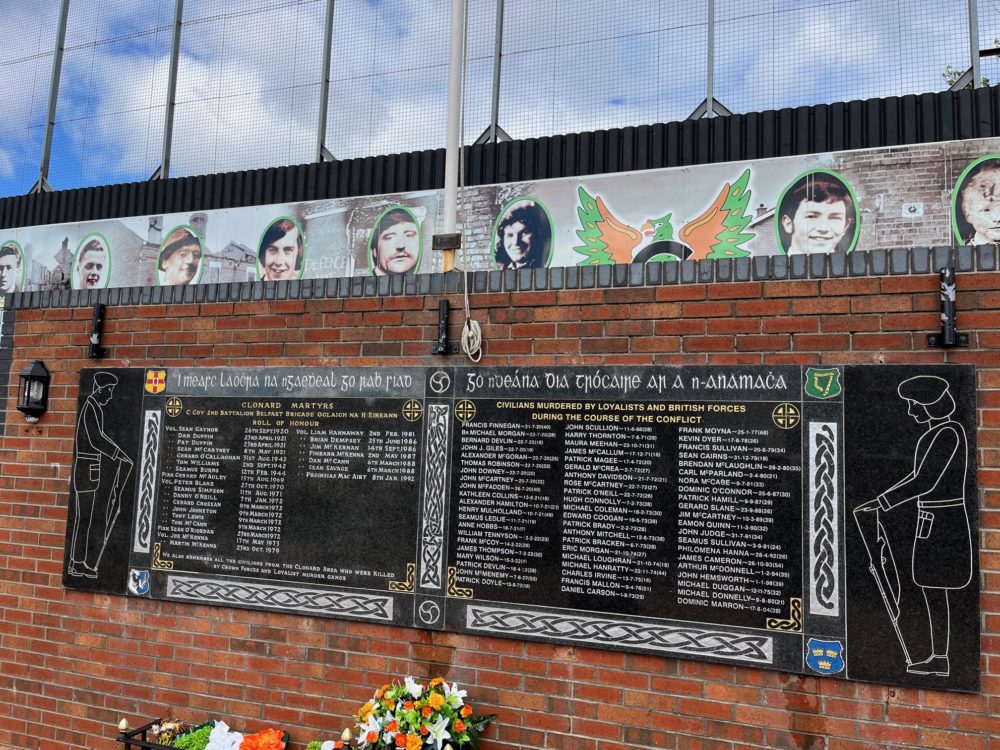Letter from Belfast: The Tories must not be allowed to wreck peace in Northern Ireland

Martin Shipton
They neither understand nor care, but those in the Conservative Party who want the UK to quit the European Convention on Human Rights are endangering the peace agreement that has kept Northern Ireland largely free of terrorism for more than a quarter of a century.
Those visiting Belfast have to engage in considerable acts of self-deception to ignore the evidence of the still recent sectarian conflict. So far does it permeate the character of this great city that it has managed to embed itself in the tourism industry. Black taxis driven by men whose knowledge of the past may be too intimate for comfort drive foreign tourists – some of them British – around sites suffused with a painful history.
In August 1969 Catholics living in Bombay Street – an appropriate reminder of Britain’s colonial past – were burned out of their homes by a Protestant mob. Already deprived of the ability to earn a living in the city’s shipyards and elsewhere by blatant discrimination, it was now made clear to them that they had no right to live in areas barred to those regarded as nationalist scum.
Peace Wall
A laughably named Peace Wall was erected which remains intact. On the nationalist side, there is a memorial garden to IRA members killed in the conflict where tourists – myself included – take photographs that proliferate the memories of violence and its consequences.
Not far away can be found sets of murals painted by activists from both sides of the conflict. While it is demonstrably true that the main participants in what are euphemistically referred to as The Troubles laid down their arms many years ago, it would be foolish to conclude that the Good Friday Agreement negotiated in 1998 amounted to a moment when all long-standing disagreements were resolved.

We don’t need to look any further than the content of the murals to know that is the case. On the Republican side there are, of course, depictions of those including Bobby Sands who were prepared to starve themselves to death when Margaret Thatcher refused to grant them political status as prisoners of the British state.
But there is also a message written on the wall that strips away the language of reluctant compromise that characterised the agreement: “Foremost in my tortured soul is the thought that there can never be peace in Ireland until the foreign, oppressive British presence is removed, leaving all the Irish people as a unit to control their own affairs as sovereign people, free in mind and body, separate and distinct, physically, culturally and economically.” The words are from Sands’ prison diary as he prepared for the hunger strike.
Nearby, on a Loyalist section of the wall, portraits of Winston Churchill and Lord Kitchener, the military commander who fronted the British services’ recruitment strategy during World War One, are displayed with pride as a glorious tribute to those who committed their lives to the cause of the British Empire.
Antagonists
Bringing together antagonists who hold such widely divergent points of view was a huge achievement in itself, let alone drafting the terms of a power-sharing agreement that would stop them killing each other. That the accord has lasted so long – with rare interruptions caused by dissident Republicans – does not detract from the lack of trust that persists on both sides. And to this day, raising the issue of The Troubles with a new acquaintance is regarded as impolite unless one is participating in an organised event, such as an academic conference.

One thing that surprised me during a tour of the former Crumlin Road Gaol, now a privately owned “visitor experience”, was the lack of information about Republican prisoners who had been involuntary guests, including Eamon de Valera and Martin McGuinness. Why the reticence? A wish not to offend, one imagines. Those who devised the programme for today’s visitors decided to play safe by concentrating on the especially egregious crimes of the non-political inmates and the macabre elements of their executions.
Despite the restoration of devolution, therefore, it always needs to be borne in mind that maintaining the peace is something that has to be continually worked at, and not assumed as a given.
Recognising the possibility of a breakdown, parties to the agreement accepted the need for it to be validated by powerful external entities, one of whom was the President of the United States.
Another was the European Convention on Human Rights. Founded in 1953, the convention established the European Court of Human Rights (ECHR). Any person who feels their rights have been violated under the convention by a state party can take a case to the court. Judgments finding violations are binding on the states concerned and they are obliged to execute them.
Detainees
This isn’t just a theoretical concern, certainly so far as the situation in Northern Ireland is concerned. In Ireland v. United Kingdom (1979–1980) the court ruled that the five techniques developed by the UK (wall-standing, hooding, subjection to noise, deprivation of sleep, and deprivation of food and drink), as used against 14 detainees in Northern Ireland by the UK, were “inhuman and degrading” and breached the European Convention on Human Rights, but did not amount to “torture”.
Having such a ruling from the ECHR showed that the actions of the UK Government in its treatment of prisoners were regarded as unacceptable by the international community. It severely damaged the UK’s then reputation as a state that would always live up the required standards.
Yet some current and former members of the existing UK Government seem intent on taking us out of the ECHR, seeing it as an impediment to the implementation of an ill-conceived policy that would see asylum seekers sent to Rwanda.
This is not, of course, the first time that the ECHR has been used as a punch-bag by the far-right breed of Tories who have been ruling the roost. They wanted to leave the ECHR because, like the DUP, they opposed the original post-Brexit trading arrangements between the EU and the UK. For many months, this caused a major crisis that threatened to derail the Brexit deal entirely. Eventually a new protocol deemed acceptable to both sides was thrashed out. The crisis appeared over.
Now, however, the Tory zealots are at it again. This time they want to pull us out of the ECHR because it might stymie the Rwanda plan, so beloved of the right-wing hard core and papers like the Daily Mail.
Our human rights – as well as the prospects of peace in Northern Ireland – are too important to be left to the whims of such people.
Support our Nation today
For the price of a cup of coffee a month you can help us create an independent, not-for-profit, national news service for the people of Wales, by the people of Wales.







Once more, the law of “Unintended Consequences “ rears its head to confront the ignorant.